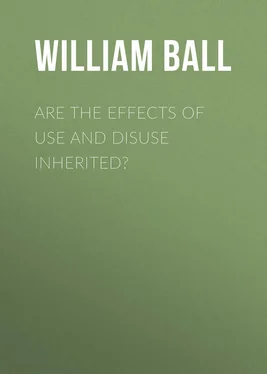William Ball - Are the Effects of Use and Disuse Inherited?
Здесь есть возможность читать онлайн «William Ball - Are the Effects of Use and Disuse Inherited?» — ознакомительный отрывок электронной книги совершенно бесплатно, а после прочтения отрывка купить полную версию. В некоторых случаях можно слушать аудио, скачать через торрент в формате fb2 и присутствует краткое содержание. Жанр: foreign_antique, foreign_prose, на английском языке. Описание произведения, (предисловие) а так же отзывы посетителей доступны на портале библиотеки ЛибКат.
- Название:Are the Effects of Use and Disuse Inherited?
- Автор:
- Жанр:
- Год:неизвестен
- ISBN:нет данных
- Рейтинг книги:5 / 5. Голосов: 1
-
Избранное:Добавить в избранное
- Отзывы:
-
Ваша оценка:
- 100
- 1
- 2
- 3
- 4
- 5
Are the Effects of Use and Disuse Inherited?: краткое содержание, описание и аннотация
Предлагаем к чтению аннотацию, описание, краткое содержание или предисловие (зависит от того, что написал сам автор книги «Are the Effects of Use and Disuse Inherited?»). Если вы не нашли необходимую информацию о книге — напишите в комментариях, мы постараемся отыскать её.
Are the Effects of Use and Disuse Inherited? — читать онлайн ознакомительный отрывок
Ниже представлен текст книги, разбитый по страницам. Система сохранения места последней прочитанной страницы, позволяет с удобством читать онлайн бесплатно книгу «Are the Effects of Use and Disuse Inherited?», без необходимости каждый раз заново искать на чём Вы остановились. Поставьте закладку, и сможете в любой момент перейти на страницу, на которой закончили чтение.
Интервал:
Закладка:
Sexual selection powerfully affects the human face, and so must affect the jaws – as is shown by the differences between male and female jaws, and by the relative lightness and smallness of the latter, especially in the higher races. Human preference, both sexual and social, would tend to eliminate huge jaws and ferocious teeth when these were no longer needed as weapons of war or organs of prehension, &c. We can hardly assume that the lower half of the face is specially exempt from the influence of natural and sexual selection; and the effects of these undoubted factors of evolution must be fully considered before we are entitled to call in the aid of a factor whose existence is questioned.
After allowing for lost teeth and the consequent alveolar absorption, and for a reduction proportional to that shown in the rest of the skull, the difference in average weight in fifty European and fourteen Australian male jaws at the College of Surgeons turned out to be less than a fifth of an ounce, or about 5 per cent. This slight reduction may be much more than accounted for by such causes as disuse in the individual, human preference setting back the teeth, and partial transference of the much more marked diminution seen in female jaws. There is apparently no room for accumulated inherited effects of ancestral disuse. The number of jaws is small, indeed; but weighing them is at least more decisive than Mr. Spencer's mere inspection.
The differences between Anglo-Saxon male jaws and Australian and Tasmanian jaws are most easily explained as effects of human preference and natural selection. We can hardly suppose that disuse would maintain or develop the projecting chin, increase its perpendicular height till the jaw is deepest and strongest at its extremity, evolve a side flange, and enlarge the upper jaw-bone to form part of a more prominent nose, while drawing back the savagely obtrusive teeth and lips to a more pleasing and subdued position of retirement and of humanized beauty. If human preference and natural selection caused some of these differences, why are they incompetent to effect changes in the direction of a diminution of the jaw or teeth? And if use and disuse are the sole modifying agents in the case of the human jaw, why should men have any more chin than a gorilla or a dog?
The excessive weight of the West African jaws at the College of Surgeons is partly against Mr. Spencer's contention, unless he assumes that Guinea Negroes use their jaws far more than the Australians, a supposition which seems extremely improbable. The heavier skull and narrower molar teeth point however to other factors than increased use.
The striking variability of the human jaw is strongly opposed to the idea of its being under the direct and dominant control of so uniform a cause as ancestral use and disuse. Mr. Spencer regards a variation of 1 oz. as a large one, but I found that the English jaws in the College of Surgeons varied from 1·9 oz. to 4·3 oz. (or 5 oz. if lost teeth were allowed for); Australian jaws varied from 2 oz. to 4·5 oz. (with no lost teeth to allow for); while in Negro jaws the maximum rose to over 5½ oz. 4 4 Inclusive in each case of fixed strengthening wire weighing about a sixteenth of an ounce or less.
In spite of disuse some European jaws were twice as heavy as the lightest Australian jaw, either absolutely or (in some cases) relatively to the cranium. The uniformity of change relied upon by Mr. Spencer is scarcely borne out by the facts so far as male jaws are concerned. The great reduction in the weight of female jaws and skulls evidently points to sexual selection and to panmixia under male protection.
I think, on the whole, we must conclude that the human jaws do not afford satisfactory proof of the inheritance of the effects of use and disuse, inasmuch as the differences in their weight and shape and size can be more reasonably and consistently accounted for as the result of less disputable causes.
DIMINISHED BITING MUSCLES OF LAP-DOGS
The next example, the reduced biting muscles, &c., of lap-dogs is also unsatisfactory as a proof of the inheritance of the effects of disuse; for the change can readily be accounted for without the introduction of such a factor. The previous natural selection of strong jaws and teeth and muscles is reversed. The conscious or unconscious selection of lap-dogs with the least tendency to bite would easily bring about a general enfeeblement of the whole biting apparatus – weakness of the parts concerned favouring harmlessness. Mr. Spencer maintains that the dwindling of the parts concerned in clenching the jaw is certainly not due to artificial selection because the modifications offer no appreciable external signs. Surely hard biting is sufficiently appreciable by the person bitten without any visual admeasurement of the masseter muscles or the zygomatic arches. Disuse during lifetime would also cause some amount of degeneracy; and I am not sure that Mr. Spencer is right in entirely excluding economy of nutrition from the problem. Breeders would not over-feed these dogs; and the puppies that grew most rapidly would usually be favoured.
CROWDED TEETH
The too closely-packed teeth in the "decreasing" jaws of modern men (p. 13) 5 5 References of course are to Factors of Organic Evolution .
are also suggestive of other causes than use and disuse. Why is there not simultaneous variation in teeth and jaws, if disuse is the governing factor? Are we to suppose that the size of the human teeth is maintained by use at the same time that the jaws are being diminished by disuse? Mr. Spencer acknowledges that the crowding of bull-dogs' and lap-dogs' teeth is caused by the artificial selection of shortened jaws. If a similar change is really occurring in man, could it not be similarly explained by some factor, such as sexual selection, which might affect the outward appearance at the cost of less obvious defects or inconveniences?
Mr. Spencer points to the decay of modern teeth as a sign or result of their being overcrowded through the diminution of the jaw by disuse. 6 6 P. 13; and Nineteenth Century , February, 1888, p. 211.
But the teeth which are the most frequently overcrowded are the lower incisors. The upper incisors are less overcrowded, being commonly pressed outwards by the lower arc of teeth fitting inside them in biting. The lower incisors are correspondingly pressed inwards and closer together. Yet the upper incisors decay – or at least are extracted – about twenty times as frequently as the closely packed lower incisors. 7 7 Tomes's Dental Surgery , pp. 273-275. Tomes observes that it is as yet uncertain in what way civilization predisposes to caries. But he shows that caries is caused by the lime salts in the teeth being attacked by acids from decomposing food in crevices, from artificial drink such as cyder, from sugar, from medicine, and from vitiated secretions of the mouth. It is evident that in civilized races natural selection cannot so rigorously insist on sound teeth, sound constitutions, and protective alkaline saliva. The reaction of the civilized mouth is often acid, especially when the system is disordered by dyspepsia or other diseases or forms of ill-health common under civilization. The main supply of saliva, which is poured from the cheeks opposite the upper molars, is often acid when in small quantities. But the submaxillary and sub-lingual saliva poured out at the foot of the lower incisors and held in the front part of the jaw as in a spoon, "differs from parotid saliva in being more alkaline" (Foster's Text Book of Physiology , p. 238; Tomes, pp. 284, 685). One observer says that the reaction near the lower incisors is "never acid." Hence (I conclude) the remarkable immunity of the lower incisors and canines from decay, an immunity which extends backwards in a lessening degree to the first and second bicuspids. The close packing of the lower incisors may assist by preventing the retention of decaying fragments of food. Sexual selection may promote caries by favouring white teeth, which are more prone to decay than yellow ones. Acid vitiation of the mucus might account both for caries and (possibly) for the strange infertility of some inferior races under civilization.
Surely this must indicate that the cause of decay is not overcrowding.
Интервал:
Закладка:
Похожие книги на «Are the Effects of Use and Disuse Inherited?»
Представляем Вашему вниманию похожие книги на «Are the Effects of Use and Disuse Inherited?» списком для выбора. Мы отобрали схожую по названию и смыслу литературу в надежде предоставить читателям больше вариантов отыскать новые, интересные, ещё непрочитанные произведения.
Обсуждение, отзывы о книге «Are the Effects of Use and Disuse Inherited?» и просто собственные мнения читателей. Оставьте ваши комментарии, напишите, что Вы думаете о произведении, его смысле или главных героях. Укажите что конкретно понравилось, а что нет, и почему Вы так считаете.












